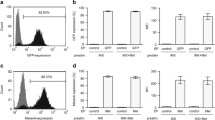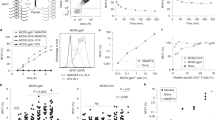Abstract
Efforts to follow tumor-specific immune responses in patients are often thwarted by lack of knowledge of the appropriate tumor antigens and the CTL epitopes of those antigens. There is, therefore, a growing need for techniques to monitor tumor-specific immune responses in settings where tumor antigens, and antigenic epitopes, remain unidentified. Here we describe a novel system to follow tumor-specific CTL immune responses. A truncated, soluble murine class I MHC (H-2Db) molecule was fused with a rat IgG2a Fc, in order to allow secretion of the complex. Tumor-specific CTL could then be detected as a result of the complex fastening to specific T cell receptors (TCR). These constructs were inserted into the genome of a recombinant adenovirus vector. Infection of tumor cells with these adenovirus constructs results in the secretion of the complexes into the culture supernatant. These soluble divalent class I MHC molecules were used to detect and activate specific CTL populations.






Similar content being viewed by others
References
Bodinier M, Peyrat MA, Tournay C, Davodeau F, Romagne F, Bonneville M,Lang F (2000) Efficient detection and immunomagnetic sorting of specific T cells using multimers of MHC class I and peptide with reduced CD8 binding. Nat Med 6:707–710
Bohm W, Thoma S, Leithauser F, Moller P, Schirmbeck R,Reimann J (1998) T cell-mediated, IFN-gamma-facilitated rejection of murine B16 melanomas. J Immunol 161:897–908
Chartier C, Degryse E, Gantzer M, Dieterle A, Pavirani A, Mehtali M (1996) Efficient generation of recombinant adenovirus vectors by homologous recombination in Escherichia coli. J Virol 70:4805–4810
Coulie PG,van der Bruggen P (2003) T-cell responses of vaccinated cancer patients. Curr Opin Immunol 15:131–137
Disis ML, Gooley TA, Rinn K, Davis D, Piepkorn M, Cheever MA, Knutson KL,Schiffman K (2002) Generation of T-cell immunity to the HER-2/neu protein after active immunization with HER-2/neu peptide-based vaccines. J Clin Oncol 20:2624–2632
Erbs P, Regulier E, Kintz J, Leroy P, Poitevin Y, Exinger F, Jund R,Mehtali M (2000) In vivo cancer gene therapy by adenovirus-mediated transfer of a bifunctional yeast cytosine deaminase/uracil phosphoribosyltransferase fusion gene. Cancer Res 60:3813–3822
Fallaux FJ, Bout A, van der Velde I, van den Wollenberg DJ, Hehir KM, Keegan J, Auger C, Cramer SJ, van Ormondt H, van der Eb AJ, Valerio D, Hoeben RC (1998) New helper cells and matched early region 1-deleted adenovirus vectors prevent generation of replication-competent adenoviruses. Hum Gene Ther 9:1909–1917
Krutmann J, Kirnbauer R, Kock A, Schwarz T, Schopf E, May LT, Sehgal PB,Luger TA (1990) Cross-linking Fc receptors on monocytes triggers IL-6 production. Role in anti-CD3-induced T cell activation. J Immunol 145:1337–1342
Ma W, Germeau C, Vigneron N, Maernoudt AS, Morel S, Boon T, Coulie PG,Van den Eynde BJ (2004) Two new tumor-specific antigenic peptides encoded by gene MAGE-C2 and presented to cytolytic T lymphocytes by HLA-A2. Int J Cancer 109:698-702
Overwijk WW, Theoret MR, Finkelstein SE, Surman DR, de Jong LA, Vyth-Dreese FA, Dellemijn TA, Antony PA, Spiess PJ, Palmer DC, Heimann DM, Klebanoff CA, Yu Z, Hwang LN, Feigenbaum L, Kruisbeek AM, Rosenberg SA,Restifo NP (2003) Tumor regression and autoimmunity after reversal of a functionally tolerant state of self-reactive CD8+ T cells. J Exp Med 198:569–580
Paul S, Regulier E, Rooke R, Stoeckel F, Geist M, Homann H, Balloul JM, Villeval D, Poitevin Y, Kieny MP,Acres RB (2002) Tumor gene therapy by MVA-mediated expression of T-cell-stimulating antibodies. Cancer Gene Ther 9:470-477
Romero P, Dunbar PR, Valmori D, Pittet MJ, Ogg GS, Rimoldi D, Chen JL, Lienard D, Cerottini JC,Cerundolo V (1998) Ex vivo staining of metastatic lymph nodes by class I major histocompatibility complex tetramers reveals high numbers of antigen-experienced tumor-specific cytolytic T lymphocytes. J Exp Med 188:1641–1650
Sadovnikova E,Stauss HJ (1996) Peptide-specific cytotoxic T lymphocytes restricted by nonself major histocompatibility complex class I molecules: reagents for tumor immunotherapy. Proc Natl Acad Sci USA 93:13114–13118
Slos P, De Meyer M, Leroy P, Rousseau C,Acres B (2001) Immunotherapy of established tumors in mice by intratumoral injection of an adenovirus vector harboring the human IL-2 cDNA: induction of CD8(+) T-cell immunity and NK activity. Cancer Gene Ther 8:321–332
Acknowledgments
This work was supported, in part, by the Convention Industrielle pour la Formation par la Recherche CIFRE.
Author information
Authors and Affiliations
Corresponding author
Rights and permissions
About this article
Cite this article
Calmels, B., Paul, S., Ziller, C. et al. Secretomers as a new tool for the monitoring of CTL responses. Cancer Immunol Immunother 54, 548–556 (2005). https://doi.org/10.1007/s00262-004-0628-3
Received:
Accepted:
Published:
Issue Date:
DOI: https://doi.org/10.1007/s00262-004-0628-3




